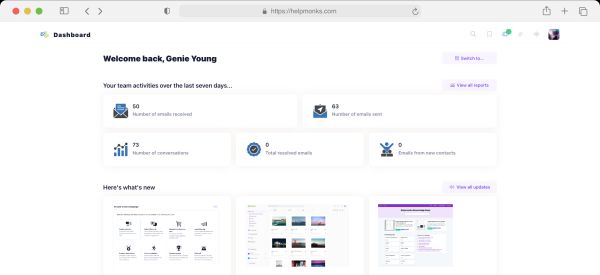
In a world where customers are more discerning and informed than ever, the old adage "the customer is always right" couldn't be truer. To accommodate this trend, a customer success manager (CSM) emerges as the essential protagonist in the story of business prosperity and client happiness.
Customer management is the conduit between consumers and the company. A customer manager ensures clients gain maximum value from a product or service.
This article delves deep into the role of a customer success (CS) manager by shedding light on their core responsibilities, duties, and the skills that drive their excellence. By the end of this exploration, you'll have familiarized yourself with the undeniable value they can bring to your business.
What is Customer Management?
Customer management is the process of managing the relationships between a business and its existing and potential clients. It is a crucial aspect of business that helps establish trust, loyalty, and a positive brand reputation.
This process involves:
- Offering personalized customer support
- Providing tailored services and products
- Anticipating client needs
- Delivering value to consumers
- Creating a positive impression on existing and potential customers
- And more
The Role of a Customer Success Manager
A CSM is tasked with cultivating and deepening customer relationships, ultimately driving user satisfaction and loyalty. Their responsibilities include:
Onboarding and Training
One of the key duties of a CSM is to oversee the onboarding and training process for new customers. This involves understanding their requirements, setting up individual accounts, providing relevant user education materials, and ensuring that customers have the necessary tools in place to use your product or service successfully.
They're tasked with:
- Working with clients to develop a comprehensive onboarding plan: This includes establishing a timeline, setting expectations, and outlining the necessary steps to begin using the product or service.
- Conducting user training sessions: CSMs provide customers with an overview of the features available on the product or service, as well as how to use them effectively.
- Creating user materials: CSMs create instructional content such as user manuals, tutorials, and FAQs to help users become more efficient in their use of the product or service.
Customer Support
Once customers are onboarded, CSMs provide ongoing support for any questions or issues that arise during usage. This may include:
Troubleshooting customer issues: CSMs investigate and resolve client problems while providing guidance on how to prevent similar issues in the future.
Assisting with product upgrades: CSMs help customers understand new features of the product or service, as well as evaluate their potential benefits.
Providing feedback to product development teams: CSMs communicate customer feedback to product teams, helping them improve the product or service and finding ways to respond better to user needs.
By providing timely and helpful support, CSMs can help your customers feel valued and supported. This will increase customer satisfaction and lead to long-term success.
User Engagement and Support
Once the onboarding process is complete, CSMS must keep track of their customers' engagement and usage. To guarantee that clients maximize their product or service usage, they track key metrics such as user retention, time on site, and feature adoption.
Additionally, the sole responsibility of the CSM is to ensure proactive support is delivered to tackle all grievances or worries effectively. This involves tailored consultations to help customers extract maximal value from their product or service, as well as providing feedback on bolstering their experience.
It is also critical for the CSMs to stay current on all internal changes so that client queries can be addressed using accurate and timely responses.
The overall goal is for CSMs to keep customers engaged and satisfied throughout their product or service's lifecycle. This will ensure long-term success and a positive customer experience, leading to increased loyalty and repeat purchases.
Account Management
Customer success managers are also responsible for managing customer accounts. This involves monitoring changes in requirements and product usage, as well as exploring customer interactions and future needs.
CSMs must ensure that customers' needs are met and that account health remains sound by staying in close contact and keeping everything updated.
Besides that, CSMs must be able to identify when a user needs additional value from their product or service and take steps to help them succeed. This could include recommending alternative products or services, offering discounts or promotions, or providing additional customer onboarding and training resources.
Account management is critical for ensuring customer success and satisfaction. CSMs must regularly review accounts, identify potential issues or opportunities for improvement, and take necessary steps to ensure long-term success.
Retention and Renewal
By proactively identifying and mitigating risks, CSMs prevent the ever-dreaded churn and foster long-term customer loyalty. They need to identify customers near their renewal date and ensure the product/service meets their needs.
At the same time, CSMs should strive to build relationships with customers and nurture loyalty by offering special promotions or discounts for renewing early. They should also take steps to increase client satisfaction by addressing any issues or concerns that arise.
Customer retention and renewal are critical to companies. CS managers are responsible for ensuring continuous customer engagement and value from products/services.

Upselling and Cross-selling
A good CSM knows when to suggest additional products or services that benefit their clients, thereby increasing revenue.
Upselling is the process of suggesting a higher-priced product or service to a customer. This is beneficial for both the customer and the business. Upselling can help people make informed purchase decisions, resulting in greater satisfaction in the long run.
Furthermore, businesses can boost revenue through this technique by selling products or services that users may have been oblivious to or lacked enthusiasm for.
On the other hand, cross-selling involves suggesting additional products or services that complement a customer's initial purchase. This sales technique aims to provide a more complete and satisfying experience for the user, along with the benefit of increasing sales revenue for the business.
Cross-selling benefits customers by giving them more options to explore and create tailored solutions for their needs. It also helps businesses increase revenue through additional sales opportunities.
By upselling and cross-selling, CS managers can offer greater value to clients while boosting business revenue. To deliver the best possible experience, customer success managers must stay abreast of product offerings and industry trends. It's their job to know what's what, so they can serve customers with finesse.
Feedback and Improvement
One of the biggest roles of a CSM is to receive and address customer feedback. This empowers them to maintain peak levels of customer satisfaction, detect scopes for advancement, and strive toward delivering the ultimate customer experience.
Furthermore, it aids CSMs in comprehending the desires of customers for their products or services, enabling them to take proactive measures to fulfill such needs. By gathering feedback, CSMs can formulate strategies for enhancing the customer service experience and ascertaining the timely fulfillment of customer needs.
CSMs also use feedback to identify new opportunities for upselling or cross-selling and create tailored solutions for each client. The ability to personalize experiences is crucial for cultivating lasting customer loyalty. This enables businesses to tailor their services to each individual, allowing them to build authentic connections that stand the test of time.
The Importance of a Customer Success Manager
A customer success manager presents many benefits to organizations across all industries. They include:
Create a Positive Customer Experience
Customer success managers are the frontline source of communication between clients and organizations. They focus on ensuring customers receive positive experiences by understanding their individual needs, providing quality service, and delivering solutions quickly to exceed expectations.
Increase Customer Retention
By fostering customer relationships through ongoing support and engagement, a CS manager can work to reduce churn rates and increase retention.
Develop Business Strategies
By analyzing user data and feedback, a customer success manager can develop strategies that help to maximize customer lifetime value, refine product offerings, and improve client satisfaction.
Improve Satisfaction and Loyalty
The primary objective of CS managers is to foster enduring customer relations. They accomplish this by delivering exceptional service while striving to exceed customer expectations with a proactive approach.
This leads to improved customer satisfaction and loyalty, which helps achieve long-term business objectives.
Reduce Overhead Costs
Customer success managers are a cost-effective option for organizations as they reduce overhead costs associated with traditional CS service roles, including call center costs and employee training expenses.
Enhance Business Performance
Customer success managers play a critical role in enhancing business performance. They provide timely feedback and insights that can be used to refine product offerings, improve customer engagement, and increase revenue.
Their work involves working closely with both clients and internal teams, ensuring customer needs are met and exceeded.
Final Thoughts
At the end of the day, having a customer success manager on board can help an organization achieve its goals, increase client satisfaction and loyalty, and improve profitability. Success hinges on finding a customer success manager whose passion for their job is matched by a talent for clear communication. Only with such proficiency can clients' requirements be met promptly and thoroughly.
One tool you can incorporate into your customer success management journey is Helpmonks. This shared inbox solution facilitates streamlined CS management by centralizing client communications, enabling teams to respond collaboratively to queries and issues more efficiently.
It provides tools for task delegation, automated workflows, customer engagement tracking, and analytics. In doing so, CS managers are empowered to ensure consistent, high-quality service, maintain customer satisfaction, and proactively address potential issues. Try it today!






